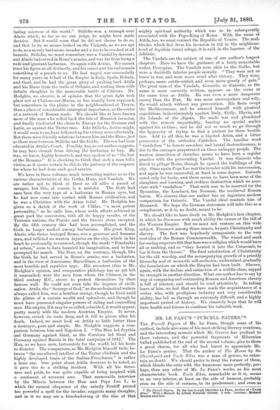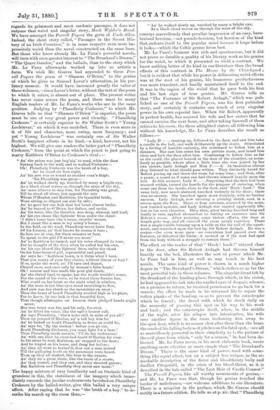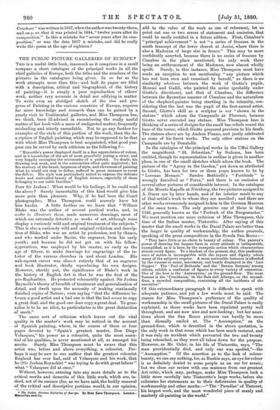MR. LE FANU'S " P1TRCELL PAPERS."*
THE Purcell Papers of Mr. Le Fans', though some of his earliest, include also some of his most striking literary creations, and the interesting memoir which Mr. Graves has prefixed to these volumes, and the powerful fragments of Hibernian ballad published at the end of the second volume, give to them a great charm, for all who had learnt to appreciate Mr. Le Fann's genius. That the author of The House by the Churchyard and Uncle Silas was a man of genius, we enter- tain no doubt. We should prefer to treat the former of these, which blends the eerie with the humorous more perfectly, per- haps, than any other of Mr. Le Fanu's works, as his most characteristic book. Uncle Silas, remarkable as it is, seems to us very inferior, at least on the side of humour, probably even on the side of eeriness, to its predecessor ; and even as
• The Purcell Papers. By the late Joseph Sheridan Le Faun, Author of "Uncle Silas." With a Memoir by Alfred Peroeval Oraves. 8 vols. London : Richard Bentley and Son.
regards its grimmest and most sardonic passages, it does not surpass that weird and singular story, Mark Wyldees Hand. We have amongst the Purcell Papers the germ of Uncle Silas. Indeed, the short story called, "Passages in the Secret His- tory of an Irish Countess," is in some respects even more im- pressively weird than the novel constructed on the same lines. But those who know already Mr. Le Fanu's powerful novels, will turn with even greater interest to "The Drunkard's Dream," "The Quare Gander," and the ballads, than to the story which Mr. Le Fanu afterwards worked up into so artistic a form. We wish Mr. Graves had appended to these Pur- cell Papers the poem of "Shamus O'Brien," to the genius of which he gives us Samuel Lover's attestation, in his pre- fatory memoir. It would have increased greatly the value of these volumes,—since Lover's letter, without the text of the poem to which it refers, is almost out of place. The present writer has never come across the poem, and there must be many English readers of Mr. Le Fanu's works who are in the same position. Judging by "Phaudhrig Crohoore," to which Mr. Graves tells us that "Shamus O'Brien" is superior, the poem mast be one of very great power and vivacity. "Phaudhrig Crohoore" is certainly superior to Sir Walter Scott's "Young Lochinvar," on which it was modelled. There is even more in it of life and character, more swing, more buoyancy ; and yet "Young Lochinvar " was certainly one of Sir Walter Scott's happiest efforts in its kind,—a kind, however, not his highest. We will give our readers the latter part of "Phaudhrig Crohoore," from the point at which the priest is just going to marry Kathleen O'Brian to Crohoore's rival :— " An' the priest was just beg'nin' to read, whin the door
Sprung back to the wall, and in walked Crohoore- Oh! Phaudhrig Crohoore was the broth of a boy, An' he stood six foot eight, An' his arm was as round as another man's thigh,
'Tis Phaudbrig was great— An' be walked slowly up, watched by many a bright eye,
As a black cloud mores on through the stars of the sky, An' none sthrove to stop him, for Phamihrig was great, Till he stood all alone, just apposit the sate Where O'Hanlon and Kathleen, his beautiful bride, Were sitting so illigant out side by side ; An' he gave her one look that her heart almost broke, An' he turned to O'Brien, her father, and spoke, An' his voice, like the thunder, was deep, stbrong, and loud, An' his eye shone like lightnin' from under the cloud: didn't come here like a tame, crawlin' mouse, Bat I stand like a man in my inimy's house; In the field, on the road, Phaudhrig never knew fear, Of his foemen, an' God knows he scorns it here ; So lave xno at aise, for three minutes or four, To speak to the girl I'll never see more.'
An' to Kathleen ho turned, and his voice changed its tone,
For he thought of the days when he called her his own,
An' his eye blazed like lightnin' from under the cloud On his false-hearted girl, reproachful and proud, An' says he : Kathleen bawn, is it three what I hear, That you marry of your free choice, without threat or fear?
If so, spake the word, an' I'll turn and depart, Chated once, and once only by woman's false heart.'
Oh! sorrow and love made the poor girl dumb, An' she thried hard to ;make, but the words wouldn't come, For the sound of his voice, as he stood there fornint her, Wint could on her heart as the night wind in winther, An' the tears in her blue eyes stood trembling to flow, And pale was her cheek as the moonshine on snow ; Then the heart of bouid Phaudhrig swelled high in its place, For he knew, by one look in that beautiful face, That though sthrangers an' foemen their pledged hands might sever, Her true heart was his, and his only, for ever.
An' he lifted his voice, like the agle's hoarse call, An' says Phandbrig, She's mine still, in spite of yez all !' Then up jumped O'Hanlon, an' a tall boy was he, An' he looked on bould Phaudhrig as fierce as could be, An' says he, By the hookey ! before you go out, Bould Phaudhrig Crohoore, you must fight for a bout.' Then Phaudhrig made answer, I'll do my endeavour,' An' with one blow he stretched bonld O'llanlon for ever.
In his arms he took Kathleen, an' stopped to the door; And he leaped on his horse, and flung her before ; An' they all were so bother'd, that not a man stirred Till the galloping hoofs on the pavement were heard.
Then up they all started, like bees in the swarm, Au' they riz a great shout, like the burst of a storm, An' they roared, and they ran, and they shouted galore; But Kathleen and Phaudhrig they never saw more."
The happy mixture of easy familiarity and an Ossianic kind of grandeur in this, the stateliness of the imagery which imme- diately succeeds the jocular endearments lavished on Phaudhrig Crohoore by the ballad-writer, give this ballad a very unique effect. After saying that he was "the broth of a boy." to de- scribe his march up the room thus,—
" An' he walked slowly up, watched by many a bright eye, As a black cloud moves on through the stare of the sky,
conveys marvellously that peculiar impression of an easy, hare- brained heroism,—not pseudo-heroism, but heroism of the kind that endears itself to the popular mind because it leaps before- it looks,—which the Celtic genius loves best.
Mr. Le Fanu's humour was rich- and spontaneous, but it did not prove so durable a quality of his literary work as his genius for the weird, to which it presented so vivid a contrast. We- know nothing better of its kind in our literature than the broad effects of this contrast in The House by the Churchyard ; but it is evident that while his power in delineating weird effects was at the root of his genius, his humorous productiveness was more transient, and hardly maintained itself to the end. It was in the region of the weird that he gave both his first and his last sign of true genius. Mr. Graves tells us that "The Fortunes of Sir Robert Ardagli," which was pub- lished as one of the Purcell Papers, was his first published story, and certainly it contains one touch of very singular power in his own especial line. When Sir Robert, apparently in perfect health, has assured his wife and her sisters that he cannot survive the next hour, and after taking farewell of them retires to his room, the three affrighted sisters all following him without his knowledge, Mr. Lo Paint describes the result as follows :—
"Lady D—, starting up, followed to the door, and saw him take- a candle in the hall, and walk deliberately up the stairs. Stimulated by a feeling of horrible curiosity, she continued to follow him at a distance. She saw him enter his awn private room, and heard him close and lock the door after him. Continuing to follow him as far as she could, she placed herself at the door of the chamber, as noise- lessly as possible, where after a little time she was joined by her two sisters, Lady Ardagh and Miss F—d. In breathless silence they listened to what should pass within. They distinctly heard Sir Robert pacing up and down the room for some time; and then, after a pause, a sound as if some one had thrown himself heavily upon the bed. At this moment, Lady D—, forgetting that the door had beon. secured within, turned the handle for the purpose of entering, when some one from the inside, close to the door, said Hush ! hush !' The same lady, now much alarmed, knocked violently at the door ; there was no answer. She knocked again more violently, with no further success. Lady Ardugh, now uttering a piercing shriek, sank in a swoon upon the floor. Three or four servants, alarmed by the noise, now hurried upstairs, and Lady Ardagh was carried apparently life- less to her own chamber. They then, after having knocked long and loudly in vain, applied themselves to forcing an entrance into Sir- Roberts room. After resisting some violent efforts, the door at length gave way, and all entered the room nearly together. There was a single candle burning upon a table at the far end of the apart- ment, and stretched upon the bed lay Sir Robert Ardagh. Ho was a corpse—the eyes were open—no convulsion had passed over the- features, or distorted the limbs—it seemed as if the soul had sped from the body without a struggle to remain there."
The effect on the reader of that" Hush ! hush !" uttered close to the door, after Sir Robert Ardagh had thrown himself heavily on the bed, illustrates the sort of power which Mr. Le Fanu had in him, as well as any touch in his best novels. The same kind of power is shown in a much higher degree in "The Drunkard's Dream," which strikes us as far the most powerful tale in these volumes. The singular dread felt by the drunkard of the landing-place, through which, in his vision, he had appeared to sink into the vaulted cave of despair, whence, on a promise to return, he received permission to go back for a season ; the effort he made in his reformed life to repair the rotten planks of the landing, so as to prevent the catastrophe- which he feared ; the dread with which he dwelt daily on the necessity of passing this spot on his way to his work and back ; and the catastrophe itself, when, in the middle of the night, after his relapse into intoxication, his wife- sees another figure in the room beckoning him away to the open door, which is no sooner shut after them than she hears the crash of his falling body as it pitches on the fatal spot,—are all as marvellously powerful in their simplicity as is the picture of the evil place from which, " only for a season," he had been de- livered. Mr. Le Fanu never, in his most elaborate book, wrote anything more effective or more simple than "The Drunkard's Dream." There is the same kind of power, used with some-
thing like equal effect, but on a subject less unique, in the re- markable description of the fierce and bloodthirsty bully and duellist Fitzgerald, in the crisis of his blood-thirst, as it is. described in the tale called "The Last Heir of Castle Connor."
he Purcell Papers, like all worthy monuments of genius,— and Mr. Le Fanu was that, though his genius touched the border of melodrama,—are welcome additions to our literature..
There is a misprint in the preface, which Mr. Graves should rectify in a future edition. He tells us at p. xiv. that "Phaudhrig
Croohore " was written in 1837, when the author was twenty-three, and on p. xv. that it was printed in 1844, "twelve years after its composition." Is this a mistake for "seven years after its com- position," or was the date 1837 a mistake, and did he really write thii poem at the age of eighteen ?




































 Previous page
Previous page